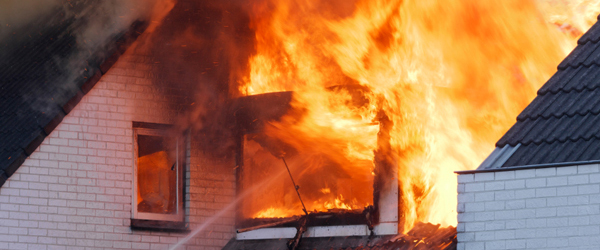
What if you suspected a fire emergency in your home? Would you know what to do?
Many of us have practiced fire drills when we were in school, and some of us may have even gone through a fire emergency drill at work.
It’s a wise idea for families to talk about what they’d do to escape a fire emergency. As each family is different and each home is different, each family will have different plans and strategies.
Obviously, if you suspect a fire, the main thing you want to do is to get you and your loved ones out of the home safely and quickly. Once you are out of your home, you’ll then want to contact the local fire department and give them the information.
Since escape is the most important thing you can do if you suspect a home fire, let’s focus on customized escape route planning.
Customized Escape Route Planning
Smoke from a fire can make things hard to see in your home. It’s important to memorize all smoke detectors and escape routes from the home, including windows. And if you live in an apartment or condo, make sure you know the locations of all the exit stairways.
It’s important to know multiple ways out of the home. In the event of an emergency, your primary escape route may be blocked. That’s why it is wise to plan multiple exit points.
Check the Doors
If you are in a room with a closed door and you suspect a fire emergency, DO NOT OPEN THE DOOR without first taking a few safety precautions:
· Check the bottom frame of the door to see if smoke or heat is coming through the crack between the door and the floor. Check around all cracks around the door.
· If you see smoke or feel heat through the cracks in the door, DO NOT OPEN THE DOOR. Find another way out of the room.
· If you don’t see smoke or feel heat, TOUCH THE DOOR. If it is hot or warm, don’t open the door and find another way out of the room.
· If the door is not hot or warm, and you have not seen smoke, TOUCH THE DOOR KNOB. If the doorknob is hot or warm, do not open the door.
· If the doorknob is cool, and you’ve seen no smoke, SLOWLY AND CAREFULLY OPEN THE DOOR. If you feel a burst of heat, or smoke comes in the room, close the door immediately. If there’s no smoke or heat, proceed with your emergency escape plan.
Stay Low and Work the Windows
It’s natural for smoke to rise, so staying close to the ground means you can crawl under most of it. And since most people die from smoke inhalation, staying away from smoke is quite important. You’ll breathe less smoke when you stay close to the ground.
Your primary goal when escaping a home fire emergency is to exit outside through a door. If that’s not possible, you may need to use a window.
All family members should know how to unlock windows, open them and to remove the screens. For second story windows, retractable, collapsible fire escape ladders are nice escape tools.
Pets and Meeting Places
Designate a meeting place outside of the home for all family members to meet up in the event of a fire emergency.
And teach your children not to re-enter the home for any reason, including looking for the family pet or favorite toy. Let fire safety personnel know what’s inside, and hopefully they can help.
If You Can’t Get Out of the Home Right Away
If there is a reason you can’t get out of the home right away, you’ll want to use your cell phone to call for help, or open a window to yell for help.
Never, ever hide in a closet or under a bed to escape smoke or flames. Fire safety personnel or loved ones may be looking for you and they won’t find you if you are not in view. They have no hope of helping you if they can’t see you.
While you are waiting for help, put sheets, clothing or anything available to block smoke from creeping under the door. If there is a window you can’t use to escape from, open it anyway and stand in front of it and call for help.
Place a cloth, towel or article of clothing over your mouth. This helps filter smoke when you are breathing. You can also wet the article for even better protection.
Practice and Prepare
Although it’s great to talk about home fire escape plans, it’s even more effective to practice them, especially for small children and senior citizens. Practice gives everyone a chance to prepare for a real emergency. Practice family home fire escape drills at least twice a year, every year.
My Alarm Center has home fire protection systems for homes just like yours. These security systems detect smoke and carbon monoxide and summon help when needed. For more information, call us at 855-334-6562.
